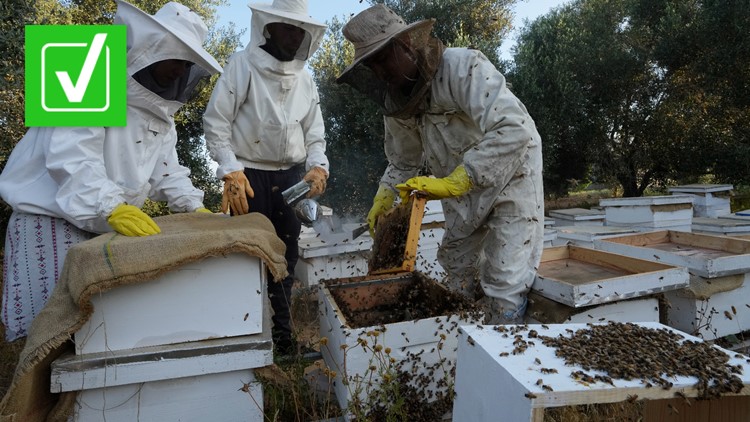A few days after Queen Elizabeth II died on Sept. 8, the Daily Mail published an article with the headline: “Royal beekeeper has informed the Queen's bees that the Queen has died and King Charles is their new boss in bizarre tradition dating back centuries.”
In response to the story, one person on Twitter said they had to check if a parody account posted the article, “because this is just sensational stuff.” Another Twitter user referred to the practice as an example of “hysteria” over the monarch’s passing.
THE QUESTION
Is “telling the bees” a real tradition?
THE SOURCES
- JSTOR Daily, which uses research from JSTOR’s academic journal database to provide context for current events
- Debra Shutika, Ph.D, folklorist and beekeeper
- Mark Norman, folklore author and researcher
- Floyd Shockley, Ph.D, entomologist at the National Museum of Natural History
THE ANSWER
Yes, “telling the bees” is a real tradition, and it’s not reserved just for news about monarchs or death.
WHAT WE FOUND
The practice of “telling the bees” is a tradition in which a beekeeper notifies their honey bees of major events in the beekeeper’s life, such as a death or marriage. It has historically been most common in the U.S. and western Europe.
“It's certainly not a royal tradition,” Mark Norman, a folklore author and researcher, said. “It's not something that would only be done by beekeepers who were keeping swarms for the royal family or other members of that household.”
Instead, Norman said, this is a very old custom that has been practiced by common people who kept bees for their own purposes.
“The idea here is that when there's important news, both good and bad, whether someone is dying or moving away, or if there are babies being born, etc., that you share the news with the bees because they are part of your family and community,” said Debra Shutika, a folklorist and beekeeper.
The news shared by beekeepers who practice this tradition varies from place to place, but informing bees of a notable death is common everywhere it's practiced, says a 2018 article in JSTOR Daily, which uses research from its academic journal database to provide context for current events.
Some beekeepers will knock on their hives and tell the bees the news, Shutika said, while other beekeepers might just simply walk up to the hives and talk to them.
Norman said there was a version of the tradition in New Hampshire where beekeepers would have to sing to the bees the news in rhyming verses.
In the case of a death, the tradition typically calls for the beekeeper to tie a black cloth around the hives or to shroud the bees in some kind of black material. Photos in the Daily Mail article show the royal beekeeper tied a black cloth around the queen’s beehives.
More from VERIFY: No, Prince Philip’s body was not stored in a ‘fancy refrigerator’
Both Norman and Floyd Shockley, an entomologist at the National Museum of Natural History, said the tradition likely traces back to ancient Celtic mythology, although its exact origins aren't known for certain.
But the practice became most common in the 18th and 19th centuries, when it was believed that keeping the bees out of the loop would invite ill fortune, Norman said.
“If you didn't do this the bees would become possibly very ill and stop producing honey, or they would vacate the hives completely because they hadn't been informed,” Norman said. “This obviously comes from a time when superstition was much stronger than it is now, because without the scientific evidence behind it, people looked for obvious reasons why bad things would happen, and then would try to avoid them in the future so that crops didn't fail, so that animals were not sick, and so on.”
Shockley said, perhaps unsurprisingly, there is no scientific evidence bees actually react to what they’re being told. But he suggested that beekeepers might still be capable of communicating information to their bees when they’re telling them the family news.
“Bees and many other social insects do react to tone, volume of sound,” Shockley said. “Many of the times that people are telling the bees they're whispering to the bees because if you are overly aggressive, the bees will respond to tone, volume, perhaps even scent — because your physiology changes when you're angry or sad.”
Shutika said she thinks it’s likely that past royal beekeepers have told the bees about the passing of previous monarchs whenever that’s happened because “generally, this is what a beekeeper will do.”
“These are living creatures, and we've decided to be responsible for them,” Shutika said of beekeepers. “So I think that it's a very common thing for a human, when you're spending so much time taking care of, in this case, an insect or a colony of insects, that you do grow great affection for them. And it would make sense in those contexts to actually share your life with them, particularly important news.”













